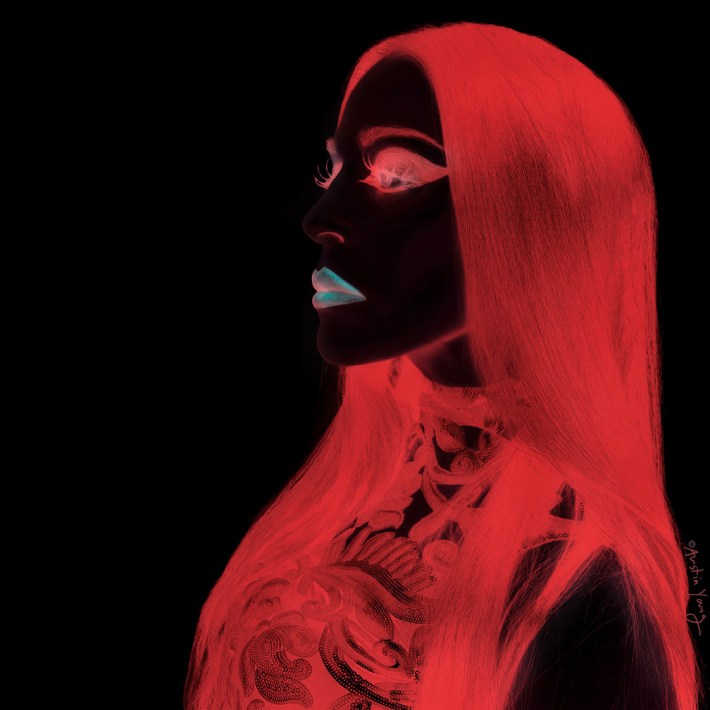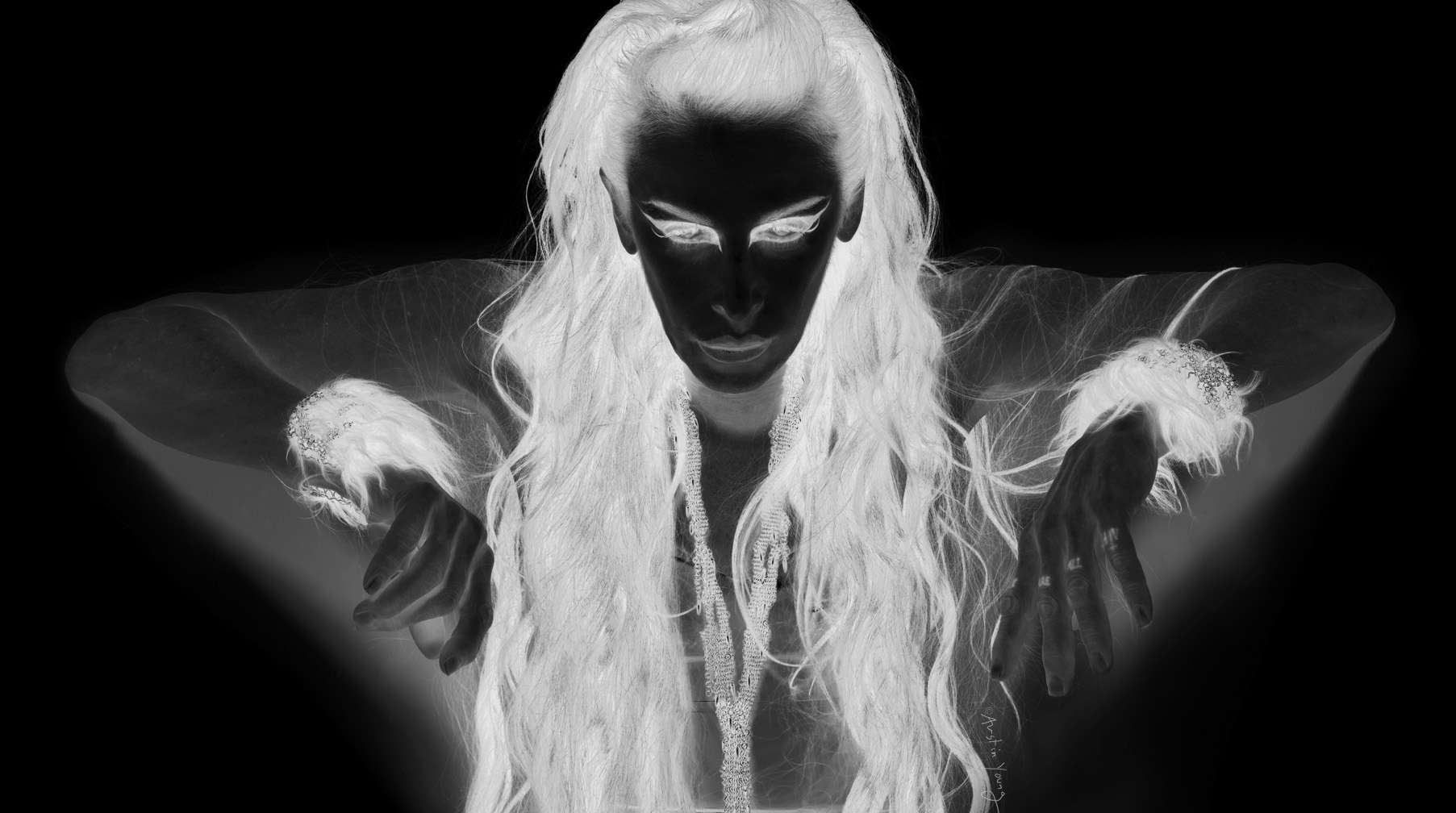The interior of the church was painted solid white; against this backdrop, a spidery figure sat at her nine-foot Steinway, casting enormous, foreboding shadows across the deconsecrated altar of Saint Thomas The Apostle in Harlem. Her fingers flew across the keys, and from her throat issued a blood-curdling shriek, her voice overlapping itself again and again as she cycled between singing in English, Italian, Greek, and German, translating poems into music, and converting American traditional songs like "O Death" into a style more befitting of its morbid nature.
This was the incomparable avant-garde icon Diamanda Galás, returning to a New York stage after an absence of nearly eight years. During that time, she’d been living in San Diego to support her Greek immigrant mother through illness and grief, working on new material, and occasionally playing one-off shows throughout Europe. That night, her ungodly energy made it feel as though the cathedral were being re-consecrated, this time in favor of more sinister, demonic forces.
Galás is set to give two encore performances in New York at the Murmrr Theater (moved from the Co-Cathedral of Saint Joseph), one on Oct. 29, the other, fittingly, on Halloween. The shows commemorate two records she released earlier this year -- All The Way, a collection of reimagined American standards, plus a live recording of the Saint Thomas performance -- via her new imprint, Intravenal Sound Operations. They’re her first LPs since 2008’s Guilty Guilty Guilty, and showcase Galás as a singular performer, capable of remaking any material she chooses in her own unnerving style. The formation of her record label, on which she hopes to re-release her own records as well as never-before-heard masters, comes after parting ways with longtime label Mute Records. For an internationally renowned performer like Galás, the London-based label never provided her with proper distribution; it was her global appeal that led her to hire a European manager as well.
"Her fans are everywhere, but you do need to find them. Her appeal crosses generations and disciplines, in all countries," says Adam Shore, who works with Red Bull Music Academy and produced her show at Saint Thomas, as well as subsequent appearances in events in Germany and Spain. Shore says he first saw Galás perform while working as an intern on the TV show Night Music in 1989, and that her work has haunted him ever since. "It took me 25 years build up the enough courage to reach out to her," he admits.
[videoembed size="full_width" alignment="center"][/videoembed]
Despite her intimidating persona, Galás is surprisingly wholesome, her integrity as a musician and dutiful Greek daughter unassailable. She’s known for being reclusive (she doesn’t have the internet at her house because she can't bear to have anyone in to install it) but never plays into the crotchety stereotype of the hermit. Instead, she’s quick to share anecdotes and opinions -- and she has many of them -- when we speak over the phone. Her prolonged vacancy from New York was not an aberration, she says. "I didn’t perform in New York until 1982, and there was so much attention paid to that performance that I didn't like it. I was just really beginning and I wanted to be able to develop my work in peace," she recalls. "I think it's very odd that people value their perceived careers [and] visibility so much, that they would not do that. Quite frankly, the iron being hot is whether it’s in your spirit and your heart and your abilities, not what others perceive of you. All that stuff is a bunch of horseshit perpetuated in large degree by men."
Though she eventually took up residence in NYC, Galás' performances here remained relatively rare, and it was never a question that she would leave the city when her father died and her mother fell ill. Her strong Greek Orthodox heritage made Galás' San Diego homecoming imperative, and that confrontation with mortality, she says, made the morose realities behind her work and the work of others she gravitated to more vivid.
"How could it not?" she says. "In fact, so many things have become more vivid to me. Mortality has come far too close for comfort. And those things are addressed in the music and the performance, which is ephemeral. You see your life as, in a sense, ephemeral, because you become more aware of mortality. So certain things in the music become much more present."
Galás has never really been a stranger to death and suffering -- her brother Philip-Dimitri died of AIDS complications in 1986, when little was known about the disease. Not only did it trigger within her a surge of activism on behalf of AIDS awareness, but it inspired an operatic trilogy -- The Divine Punishment, Saint Of The Pit and You Must Be Certain Of The Devil, which together form The Masque Of The Red Death suite -- that humanized the AIDS epidemic while also lambasting the religious and political efforts of the time to minimize its dangers and condemn its sufferers. She was even arrested while protesting with ACT UP in San Francisco, though she shrugs it off, saying, "the majority of my activism has been my work, and essays, and talks, and so forth."
Decades later, medicines like Truvada have slowed the AIDS transmission rate among at-risk populations, despite political efforts to vilify its use. Just last week, Representative Betty Price (R-Georgia), wife of disgraced former head of Health and Human Services Tom Price, suggested that HIV patients be quarantined.
"It’s clear that with Donald Trump as a president these people are going to be able to get away with doing and saying completely absurd things," Galás says. "The fact that she would say this in 2017 is unbelievable… [but] the whole idea is not new, even to the medical community, many of whom wanted to exile people with AIDS to Plum Island," she mentions a controversial animal testing site in Suffolk County. Galás later discusses leper colonies in Greece (Spinalonga) and Hawaii (Molokai), before our conversation shifts to The Fever Hospital, an opera she’s been working on for nearly five years but has never performed in the United States. It's based on "Das Fieberspital," a hallucinatory poem about Yellow Fever patients locked in an industrial building written by German Expressionist Georg Heym in the early 20th Century.
"I find myself returning to issues of containment, of isolation, which leads to such horrible mental illness and broken hearts and the desire for immediate death," she admits. "People can say, 'Oh, that’s redundant.' And I say, 'Well, a lot of writers and artists tend to focus on particular themes that you might consider redundant, but that’s not your business, really.'"
Over and over, Galás finds objects in literature and song that speak to her. "It started in 1982, my affinity to this. I’ve done this work in many different languages," she says. "If I feel that the cadence is very liturgical, if it is familial to me, if I feel that it’s part of my rhythmic sense of time in my own work, then I go for it."
Recently, Galás was moved by a poetry collection titled The Fall Of Athens, by writer, translator, and scholar Gail Holst-Warhaft. Her poem "Spider Woman" is dedicated to Galás and recounts the story of Arachne, the mythological weaver who was turned into a spider by a jealous Athena. Holst-Warhaft points out that "our earliest Western poems, the Iliad and the Odyssey, were recited with music. Greece has an exceptional tradition of combining the two." Holst-Warhaft is also a musician, who has worked with composers Mikis Theodorakis and Manos Hadzidakis, whom she says “started a musical revolution that continued for decades” by setting Greece's modern poets to music. “I certainly think Galás has absorbed the best of Theodorakis and paid homage to Farandouri, his great singer, but I think she is perhaps more influenced by the rembetika, the Blues of Greece – songs of the 1920s, ‘30s and ‘40s,” she adds. "What I hear in her singing and her songs are echoes of the laments of the region her family is from (Mani, in the Peloponnese) or of rembetika, with other qualities and influences she grew up with -- both classical and popular. It never sounds in any way folk-like to me. She takes material and spins it in her own way: fiercely and fearlessly."
A particular style of those laments -- known in Greek as amanes or amanethes -- open two versions of "O Death," one of each appearing on All The Way and At Saint Thomas The Apostle Harlem. Galás says these are the most complicated pieces on her records, structurally speaking. "I start that with the amanes and then I move into the song, and then there is a lot of improvisational vocal work that is non-traditional. Some people would call it noise -- I don't. But I interweave all these things," she explains.
In listening to both renditions back to back, one hears the structure Galás imposes upon her pieces, but also the elegiac improvisation that happens within it, and has been the cornerstone of her discipline. "I think that those that can improvise can then give the fullest expression to their emotions," she says, pointing out that in all the traditions she’s studied, from the classical works of Chopin, Liszt, and Beethoven to be-bop and other forms of jazz, improvisation is key.
Always uncompromising and wholly original, Galás continues to terrify the mainstream, who have branded her at various times a misandrist, a Satanist, and everything in between. Like any empowered woman that patriarchal society has tried to suppress with accusations of witchery, Galás burns at her stake, glowing brightly, and seemingly eternal. She’s a real one, absolutely.
"I often deal with the subject of fear [in my work]. Anything trivial is not going to do it for me," she says. Her work has confronted disease, torture, genocide, and death -- things many struggle or outright refuse to acknowledge. "I don’t do it to remind people. I do it because [these things] terrify me, because they horrify me, and because they move me to do something. You take a step because it smacks you in the back."
Far from mining the suffering of others for crass commercialism, Galás suffers along with her subjects, and in return, her work gives them hope. "During the AIDS crisis, I used to worry that some of my music would depress people who are sick," she remembers. "And then I realized much later that in fact, a lot of people felt very close to it because it expressed what they were feeling."
When asked which of her works feel most important to her, Galás says she never looks back, only forward, and that she plans to continue to work as long as she’s able. That’s good news for her fans, because she has no suitable replacement, no matter how chic goth subculture becomes. In the last line of the poem she dedicated to Galás, Gail Holst-Warhaft writes: Art outlasts the gods that curse us. For Diamanda Galás, no truer blessing has ever been uttered.







